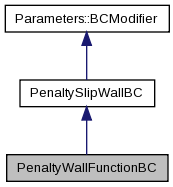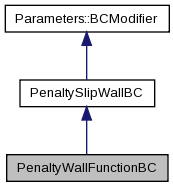#include <PenaltyWallFunction.h>


Public Types | |
| enum | WallFunctions { slipWall, logLaw, simpleLogLaw, wernerWengle, fixedUTau, numberOfWallFunctions } |
Public Member Functions | |
| PenaltyWallFunctionBC (const aString &nm) | |
| virtual | ~PenaltyWallFunctionBC () |
| virtual bool | inputFromGI (GenericGraphicsInterface &gi) |
| virtual bool | applyBC (Parameters ¶meters, const real &t, const real &dt, realMappedGridFunction &u, const int &grid, int side0, int axis0, realMappedGridFunction *gridVelocity=0) |
| virtual void | getShearStresses (const int &nd, Parameters ¶meters, const real &distance, const ArraySimpleFixed< real, 3, 1, 1, 1 > &uavg, const ArraySimpleFixed< real, 3, 1, 1, 1 > tng[], real tau[]) |
 Public Member Functions inherited from PenaltySlipWallBC Public Member Functions inherited from PenaltySlipWallBC | |
| PenaltySlipWallBC (const aString &nm) | |
| virtual | ~PenaltySlipWallBC () |
| virtual bool | setBCCoefficients (Parameters ¶meters, const real &t, const real &dt, realMappedGridFunction &u, realMappedGridFunction &coeff, const int &grid, int side0, int axis0, realMappedGridFunction *gridVelocity=0) |
| virtual bool | addPenaltyForcing (Parameters ¶meters, const real &t, const real &dt, const realMappedGridFunction &u, realMappedGridFunction &dudt, const int &grid, int side0, int axis0, const realMappedGridFunction *gridVelocity=0) |
| virtual const bool | isPenaltyBC () const |
 Public Member Functions inherited from Parameters::BCModifier Public Member Functions inherited from Parameters::BCModifier | |
| BCModifier (const aString &nm) | |
| virtual | ~BCModifier () |
Public Attributes | |
| real | fixedWallDistance |
| real | linearLayerTopYPlus |
| WallFunctions | wallFunctionType |
| bool | includeArtificialDissipationInShearStress |
| bool | useFullVelocity |
 Public Attributes inherited from PenaltySlipWallBC Public Attributes inherited from PenaltySlipWallBC | |
| real | normalFlux |
| bool | zeroTangentialVelocity |
| DBase::DataBase | db |
 Public Attributes inherited from Parameters::BCModifier Public Attributes inherited from Parameters::BCModifier | |
| aString | name |
Member Enumeration Documentation
Constructor & Destructor Documentation
| PenaltyWallFunctionBC::PenaltyWallFunctionBC | ( | const aString & | nm | ) |
References PenaltySlipWallBC::zeroTangentialVelocity.
|
virtual |
Member Function Documentation
|
virtual |
In 2D, on a curvilinear grid, this looks like:
nx * ( rx*Dor(u.t) + sx*Dos(u.t) ) + ny * (ry*Dor(u.t) + sy*Dos(u.t) ) = tau/nu
- or - Dor(u.t)*(nx*rx + ny*ry) + Dos(u.t)*(nx*sx + ny*sy) = tau/nu mprod[0] mprod[1] where u is really u-gv. If we are on an axis=0 boundary (i.e. r direction is normal) we can add
(2*side-1)* ( hr^2*(ad21+|ux|*ad22)*Do(u.t) + hr^4*(ad41+|ux|*ad42)*D+D-D+(u.t) )/nu
to the left hand side. NOTE: to be consistent with the D+D- used in the second derivative in the rest of the code we could choose to replace the Do operator above with D-. Similarly, the third derivative in the dissipation would really be D-D+D-, but this would include the second ghost line.
Reimplemented from PenaltySlipWallBC.
References a, A_3D, A_4D, A_5D, ad21, ad22, assert(), axis, InsParameters::BoussinesqModel, cc, d, Parameters::dbase, dx, f, fixedWallDistance, getShearStresses(), Parameters::gridIsMoving(), i1, i2, i3, includeArtificialDissipationInShearStress, isRectangular, mask, maskLocal, maskp, mg, PenaltySlipWallBC::normalFlux, np, nrm, off(), order, OV_APP_TO_PTR_3D, OV_APP_TO_PTR_4D, OV_GET_LOCAL_ARRAY_CONDITIONAL, OV_GET_LOCAL_ARRAY_FROM, OV_RGF_TO_PTR_5D, rx, s, side, solveSmallSystem(), tc, u, U, uc, uLocal, vc, InsParameters::viscoPlasticModel, wc, x, and PenaltySlipWallBC::zeroTangentialVelocity.
|
virtual |
Here is the actual implementation of the wall model where we compute the shear stresses on the surface from the "mean" velocity uavg. There are currently three basic models:
1) u+ = (1/kappa) ln(E y+) : which is a traditional log layer model (can also be written (1/kappa) ln (y+) + B 2) u+ = 8.3 (y+)^(1/7) : the Werner-Wengle model 3) u+ = (1/kappa) ln(y/y0) : a simple "rough wall" model sometimes used for atmospheric boundary layers
u+ = uavg/utau, y+=y*utau/nu, y0=roughness height, kappa=Karman's constant, utau = sqrt(tau/rho)
tau = mu * d(uavg .dot. tangent)/dn = mu * normal .dot. grad(uavg.dot.tangent)
There are some options to the above models:
- If y+<linearLayerTopYPlus then u+=y+
NOTE: this routine actually returns the shear stress divided by the density which is nu*d(u.tangent)/dn
We need to solve a nonlinear equation to get tau: u+ = (1/kappa) ln(E y+) which gives va = (utau/kappa) ln (E distance utau/nu)
- or - va = (X/kappa) ln( a X ) where X=utau and a = E*distance/nu.
If we write F(X) = -va + X ln (a X)/kappa we want X such that F(X) = 0. Note dF/dX = (ln(a X) + 1/a)/kappa . A simple Newton iteration gives: F(X^k + dX) = F( X^k ) + dX dF(X^k)/dX so that dX = -F(X^k)/(dF(X^k)/dX) as usual.
Guess X^0 = the werner-wengle value
NOTE: I doubt it is really this simple...
References a, PenaltySlipWallBC::db, Parameters::dbase, e, F, fixedUTau, itmax, kappa, linearLayerTopYPlus, logLaw, simpleLogLaw, slipWall, tol, useFullVelocity, wallFunctionType, wernerWengle, and yplus.
Referenced by applyBC().
|
virtual |
Reimplemented from PenaltySlipWallBC.
References PenaltySlipWallBC::db, fixedUTau, fixedWallDistance, includeArtificialDissipationInShearStress, linearLayerTopYPlus, logLaw, PenaltySlipWallBC::normalFlux, options(), simpleLogLaw, slipWall, useFullVelocity, wallFunctionType, wernerWengle, and PenaltySlipWallBC::zeroTangentialVelocity.
Member Data Documentation
| real PenaltyWallFunctionBC::fixedWallDistance |
Referenced by applyBC(), and inputFromGI().
| bool PenaltyWallFunctionBC::includeArtificialDissipationInShearStress |
Referenced by applyBC(), and inputFromGI().
| real PenaltyWallFunctionBC::linearLayerTopYPlus |
Referenced by getShearStresses(), and inputFromGI().
| bool PenaltyWallFunctionBC::useFullVelocity |
Referenced by getShearStresses(), and inputFromGI().
| WallFunctions PenaltyWallFunctionBC::wallFunctionType |
Referenced by getShearStresses(), and inputFromGI().
The documentation for this class was generated from the following files:
 1.8.3
1.8.3